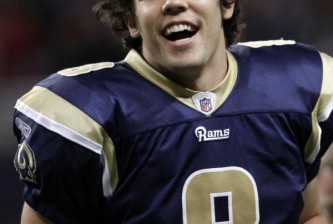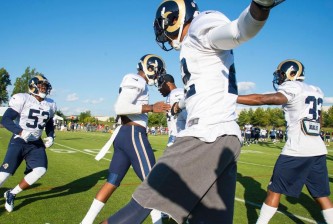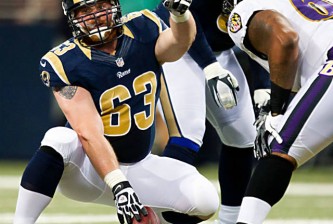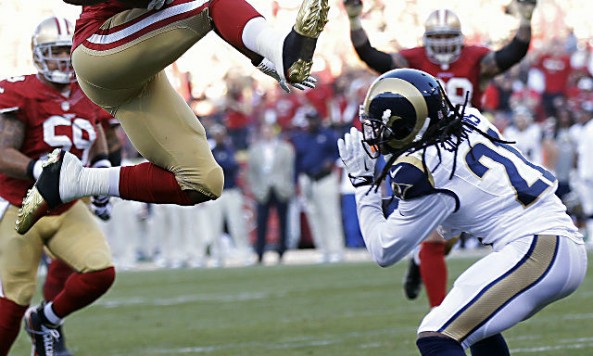The Rams tried to play a man's game in San Francisco, and lost. AP Photo / Marcio Jose Sanchez
If you were looking for subtlety, for deception, Candlestick was not the place for it. The Rams' new identity is rooted in football's caveman ethos — run the ball, hit the other guy as hard as you can, then run away. Even the passing game is rough-and-tumble, with Kellen Clemens buying time by whatever means necessary so he can heave the ball downfield as far or as hard as he can.
However, the San Francisco 49ers are the modern masters of this caveman ethos. Despite his many flaws as a tactician, Mike Singletary took it upon himself to breed the bully back into the NIners' bloodstream. He left Jim Harbaugh with a roster that, from the top to the bottom, is made up of men whose only intention is to physically dominate their opponent.
When the 49ers signed Anquan Boldin to bolster their Super Bowl credentials, they were looking for precisely this attitude. Boldin has never been fast, and is even less so after eleven seasons in the league. He wins battles through blunter methods, the same way that a schoolyard bully wins your lunch money. And Boldin has been bullying the Rams for a long time.
Boldin has caught more passes for more yards against the Rams than any other team in the NFL, and the teams he has played for have an 11-4 record against St Louis. Only his record against the Bengals and Browns, themselves no strangers to being pushed around, is better by winning percentage.
While the Rams defense played fairly well otherwise — they bottled up Frank Gore and forced enough stops to keep the game from getting completely out of hand — they simply had no answer for Boldin. Not with tiny Janoris Jenkins or easily-fooled Trumaine Johnson or any of the collection of safeties that have been pressed into coverage duties.
Colin Kaepernick threw 15 passes his way, as many as the rest of his receivers combined. Boldin came down with nine of them for 98 yards, and drew two more penalty flags along the way. In all, Boldin accounted for nine of the Niners' 20 first downs. Third and ten, third and eleven, third and fifteen, no matter. Just throw it to the biggest bully on the field and let him do his thing.
On the other side of the ball, the Rams sorely lacked that bully presence, particularly in the passing game. Clemens' three leading targets — Chris Givens, Jared Cook and Tavon Austin — combined to catch only 9 of the 22 passes thrown their way. And yes, already you should be thinking "22 passes? That doesn't sound like the blueprint."
The Rams backup QB threw only 38 passes combined in their two previous dominant wins. He threw 37 on Sunday, and time and again his receivers let him down. Yes, Clemens often rocket-armed throws that could have used more "touch," but the ball hit his receivers in the hands and then fell to the ground at least half a dozen times on Sunday.
Givens was particularly bad, displaying a pass-catching form that looked eerily like a man stuck in a phonebooth full of bees. The once-promising rookie looks lost in his second season, and might need a heavy dose of pine. (If you're looking for a silver lining, Stedman Bailey and Brian Quick both made the most of limited snaps by catching 6 of 8 balls thrown their way. Five of those six catches went for first downs or scores.)
If you're already looking ahead to the draft, I wouldn't steer you away from looking at the biggest and baddest available at either WR or CB. If this game showed anything, it's that the Rams desperately need an infusion of toughness at both positions.
—
Officiating Notes
Great way to start the game, this should be interesting today #heavyweightfight pic.twitter.com/oca0cT5IVK
— Rams Radio Network (@RamsRadio) December 1, 2013
This game had a schoolyard vibe even before the opening snap, as both teams met at midfield to jawjack between clenched teeth while striking poses with puffed-out chests the like. Nothing of note actually happened, but right off the bat referee Bill Vinovich's crew must have decided that they were one play away from a full-blown prison riot.
As such, they staged their own laundry-throwing contest under the guise of "keeping the game under control." Here is the penalty count by quarter:
1st quarter: 8 flags (four on the first drive of the game)
2nd quarter: 5 flags
3rd quarter: 3 flags
4th quarter: 4 flags
Tellingly, only two of the game's first 13 penalties were presnap infractions. By comparison, five of those penalties were purely discretionary, including two blatantly miscalled "offensive pass interference" flags and three extremely light-handed "unnecessary roughness" penalties. This was not a display of undisciplined or poorly-coached teams as much as it was a display of over-aggressive policing on the part of the zebras.
Did this policing change the game? The Rams were flagged more often and for more yards (11-105 to 9-85), but the blatantly bad calls appeared to be equally distributed. More to the point, they did little to change the tone of the game. These two teams were committed to the schoolyard game from snap one to the final whistle. Niners offensive tackle Joe Staley was knocked out of the game in the first quarter; Jake Long was kayoed in the third. Refereeing had nothing to do with either, nor could have prevented either.
This shouldn't be seen as a screed against Vinovich or his crew in particular — they are professional and competent, far more so than the Jeff Triplette clown show. This is endemic to the modern game of football, which is over-policed from the top down. This is the way that Roger Goodell wants a game of this sort to be called.
It's doubtful that Vinovich's crew will be criticized from the NFL's front offices for this performance, not the way that Bill Leavy was after bungling a key decision in a 49ers-Packers game. As long as there is an appearance of fairness and no major gaffes in interpreting the rulebook, a referee crew is given plenty of discretion in how they handle a game.
And no trope is more abused among broadcasters than Jeff Fisher's membership in the league competition committee, as an ironic subtext to any flag against the Rams. The implication is that Fisher is somehow deserving of better treatment, or should know the rules well enough to keep his team on the near side of the law.
It's ironic only because it is exactly Jeff Fisher's preferred brand of football that is being systematically stamped out of the game.























